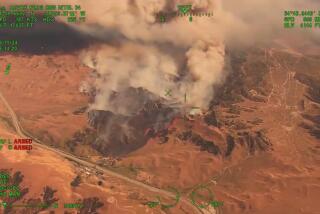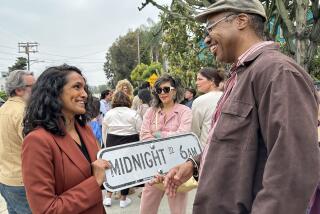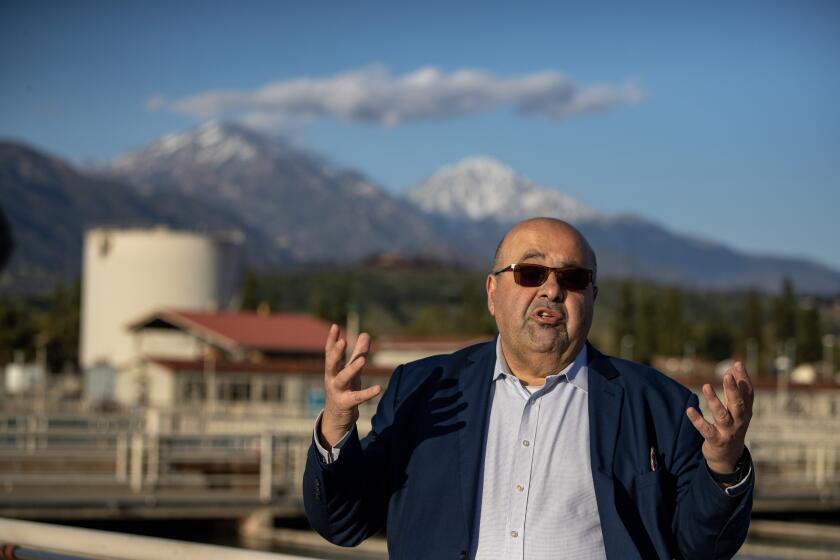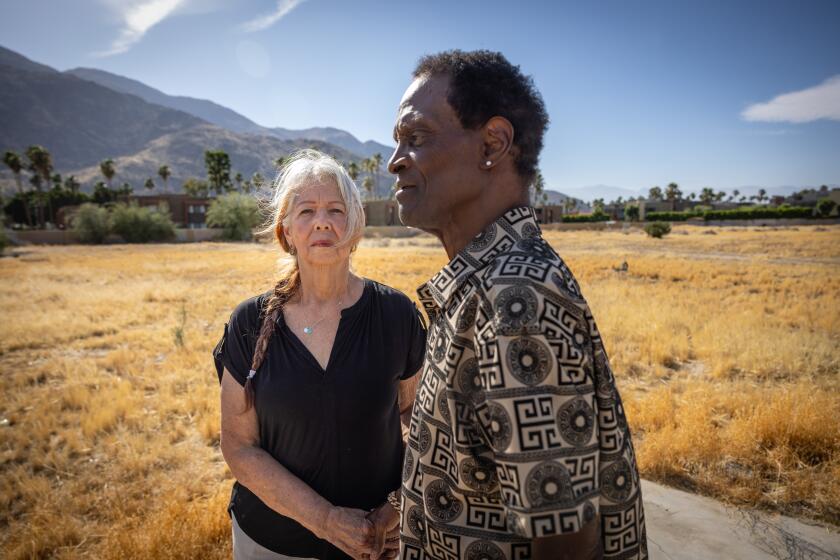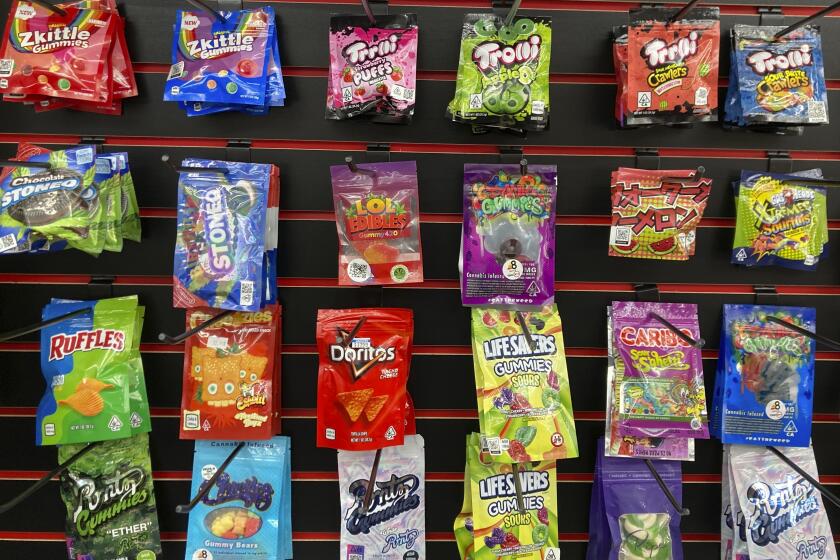Priesthood Had a Hold Ex-Wrestler Couldn’t Escape
He has traded in his leopard-skin loincloth for The Cloth, a former professional wrestler cornered by Christ at a time when most people his age are busy praising the putter.
But at age 76, Ojai native Bill Olivas--the man they once called “Elephant Boy,” the “Wild Man of Borneo” and “Zando Zabo, the bushy-haired wrestling gypsy from South America”--has been pinned by the Lord to serve his people.
On Monday night, during an hourlong ceremony at St. Thomas Aquinas Catholic Church in Ojai, Olivas became the oldest of about 500 men to be ordained as Catholic priests this year.
“Sometimes I hear that you should retire at 65 or 70, even in the priesthood,” the jovial Ojai native said during a recent interview. “Why? If you’re feeling great, why are you going to retire from serving the Lord? What are you going to do, go in front of the television and just sit there and wait for death? I don’t think it’s all over.”
Monday’s service finished what Olivas started half a century ago, before he marched off to World War II to brave German fire at Normandy and the Battle of the Bulge. Before he launched a worldwide pro wrestling career. Before he managed the idyllic Matilija Hot Springs with his wife for more than two decades.
“The Lord had other things for me to do before he finally said, ‘I’ve got you,’ ” he said with a big laugh.
But make no mistake. He is a holy man. And those who know him are not surprised to see him dedicate his golden years to God, even when, according to church officials, the average retirement age of a priest is 70.
“He’s always had this dream, ever since he was young,” said his sister, Panchita Fristrup of Ojai. “I guess this was his calling.”
Born and raised in Ojai, Olivas is the great-great grandson of Don Olivas, founder of Ventura’s historic Olivas Adobe. It was during his teenage days as a St. Thomas Aquinas altar boy that Olivas said he first got the call.
He spent two years after high school studying for the priesthood in a junior seminary in Los Angeles. But when World War II erupted, his patriotic father, William Olivas Sr., wanted his son to enlist.
“He said: ‘I have a son that’s hiding under the skirts of the church,’ ” Olivas recalled. “I didn’t think people looked at me that way. So that’s when I took off. I went to Ventura and enlisted.”
His mother, Solena Ayala Olivas, had dreamed of her son becoming a priest. She began to cry.
“Mom, it’s my decision,” he remembers telling her. “If God wants me to be a priest, he’ll keep me safe.”
Nine months before the infamous D-day invasion on the beaches of Normandy, a big, strong, 18-year-old Olivas arrived in England as a member of an Army engineering outfit.
He was a clean-cut seminary dropout and ex-high school wrestler, not the type to drink or smoke or hang out in the pubs. Instead, he lifted weights in the local gym, where he met a professional wrestler named Bobby Coleman.
At the time, professional wrestling was far more of a sport than the choreographed entertainment it is today, Olivas said. The wild names and costumes were just gimmicks to lure the masses . . . and early television, which found the sport far easier to capture with its bulky cameras than basketball.
Every Friday night, Olivas and his pals would go to the ice arena in Southampton, where pro wrestlers earned 70 pounds a match--about $210--to fight it out.
One night, Coleman’s opponent didn’t show up, and Coleman urged his friend to enter the ring.
“You’re crazy,” Father Olivas remembers telling him. “I’m not going to get up in front of all those people.”
“It’s just like in the gym,” he said Coleman urged him. “You’re going to get 70 pounds just like me.”
So Olivas wrestled that night--and almost every Friday night after that.
Not long afterward, war called again, a war that would have the impressionable Olivas clearing mines from the beaches of Normandy, trudging through the icy Battle of the Bulge, watching too many of his friends die along the way.
Just before Olivas left England, Coleman passed along his mother’s phone number in Los Angeles. If Olivas ever wanted to be a pro wrestler. . . .
As it turned out, Ojai seemed an awfully small place when he got home. He couldn’t sit still. Studying seemed unrealistic. The crack of a hand, the boom of a dropped book sent him right back to the front lines.
“This is not for me,” he told his parents. “I’m leaving. I’m going to be a professional wrestler.”
Olivas would become a big star on the pro wrestling circuit, fighting with the likes of Gorgeous George in a 25-year career that sent him on all-expense-paid trips through the United States, Europe, Australia, New Zealand and South Africa.
He never expected to meet Marcia, a pretty public health nurse in New Mexico’s Indian Affairs office.
He was introduced to her by a wrestling buddy’s mother. After dating for two years, they married, and he whisked her away for his last whirlwind tour of the world on the pro wrestling circuit.
During the trip, Marcia, long interested in arthritic therapy, was fascinated by the sulfur-rich pools she discovered in Germany. The smell reminded Olivas of the hot springs at Matilija Canyon near Ojai.
As fate would have it, when his wrestling career was over and the couple returned to Ojai, the county was trying to get rid of Matilija Hot Springs after losing money on the spa for years.
Against the advice of many who thought they were crazy, Bill and Marcia signed a lease and made the mountain resort their lives’ work.
“He was always a lot of fun to work with and probably one of the best bosses to have in your life,” said Ojai Mayor Steve Olsen, who worked as Olivas’ head lifeguard during his summers off from college in the late ‘60s and early ‘70s. “It was a great health spa. It was a major draw for people who wanted to escape from Ventura because of the marine fog layer that takes over in the summer.”
The business did well enough to support the couple through the next 22 years. Olivas broke the lease when Marcia’s heart troubles became life-threatening. She died in 1988.
But through two decades at Matilija, Olivas reconnected with the Catholic Church. He and Marcia started attending services at St. Thomas Aquinas. He became a deacon there, allowing him to do everything a priest does, except say Mass and hear confession.
“He’s got deep friendships among the parishioners,” said Mike Briley, who with his wife, Michele, has attended the church for 14 years. “People care about him and he cares about everyone.”
After Marcia’s death, he moved into the rectory and spent the next decade as the church’s business manager.
In 1991, he joined the Augustinian order as a brother. And within the last two years, he learned that his years of scriptural study and his work as a deacon and brother meant that he needed only a few seminary courses to become a priest.
Olivas plans to use his life experiences to help counsel married couples and the bereaved. He hopes to begin Spanish-language Masses for the Latino Catholics of the Ojai Valley.
And when he issues his first homily Sunday morning at 10:30, he’ll focus on reconciliation. The divided world needs healing, he said. He wants people to love one another. And there’s no age limit on saying that.
“I talk to these young lads, the altar servers,” he said. “Sometimes, when they get a little older or start going into high school, they want to quit.
“I say you’re never too old. Look at this guy. I’m the oldest altar boy around here. I’ve been serving the Lord all these years. You’re never too old. You’re never too old.”
More to Read
Start your day right
Sign up for Essential California for news, features and recommendations from the L.A. Times and beyond in your inbox six days a week.
You may occasionally receive promotional content from the Los Angeles Times.
